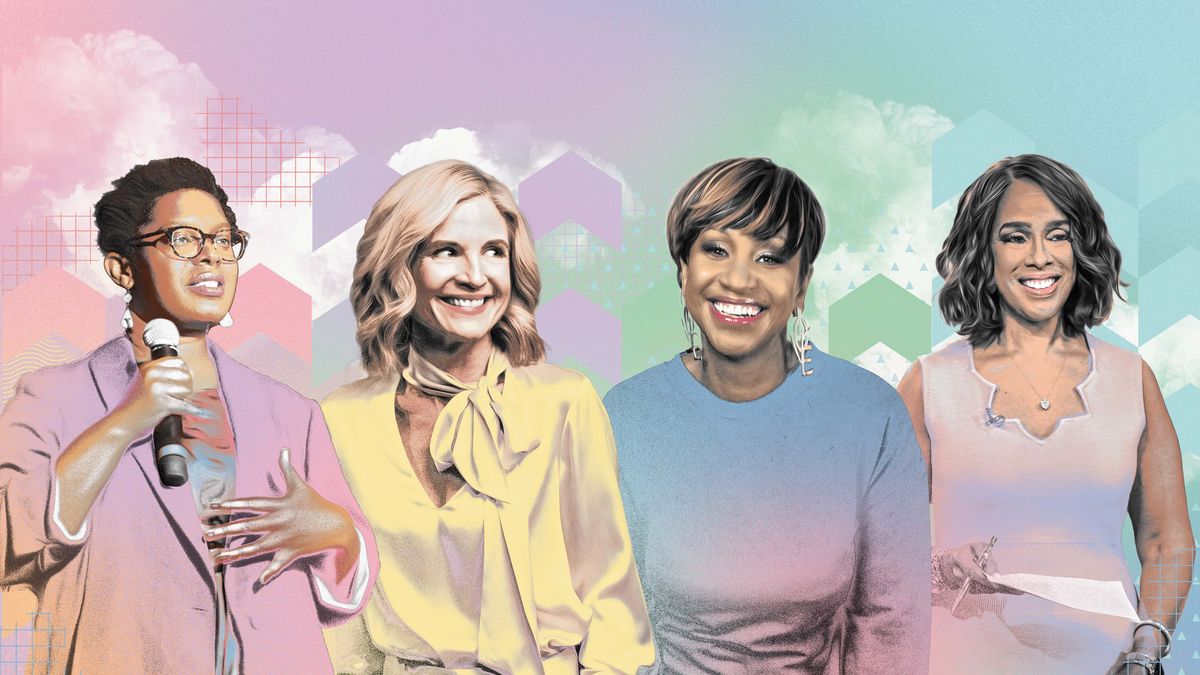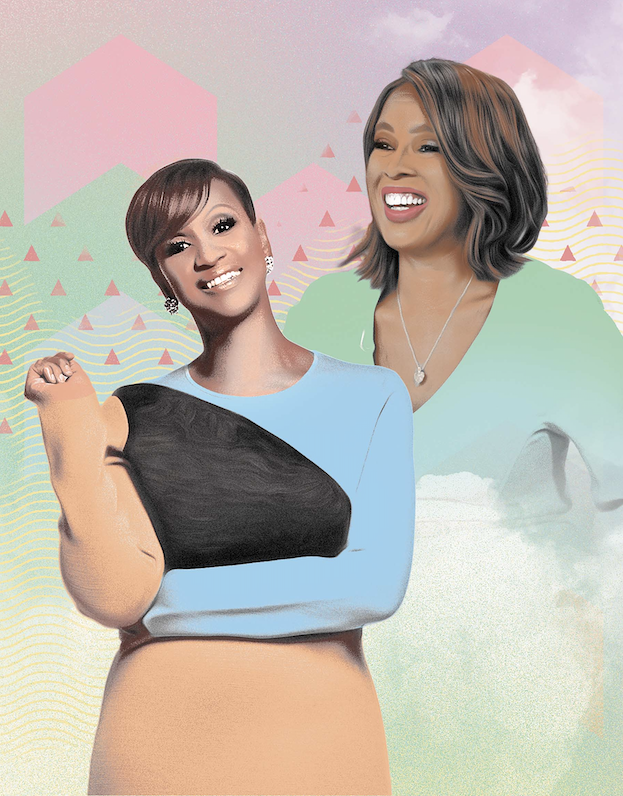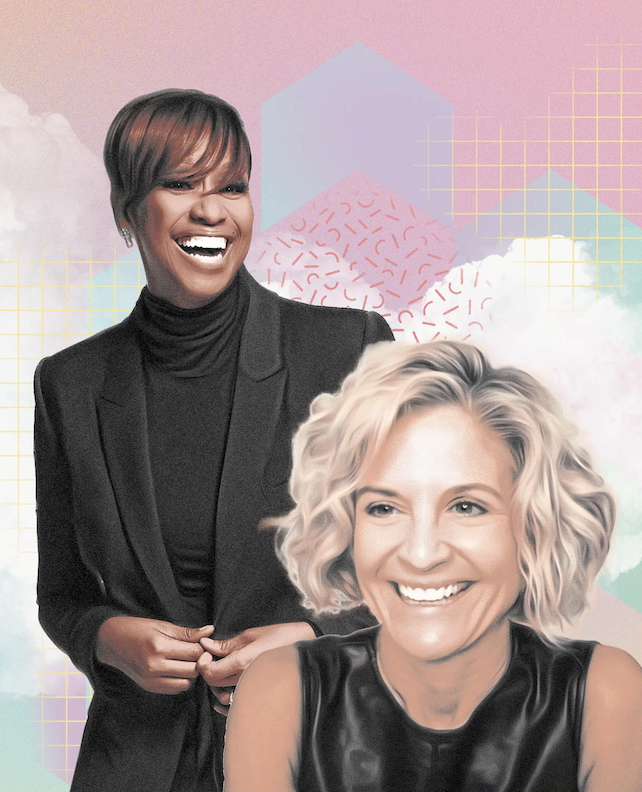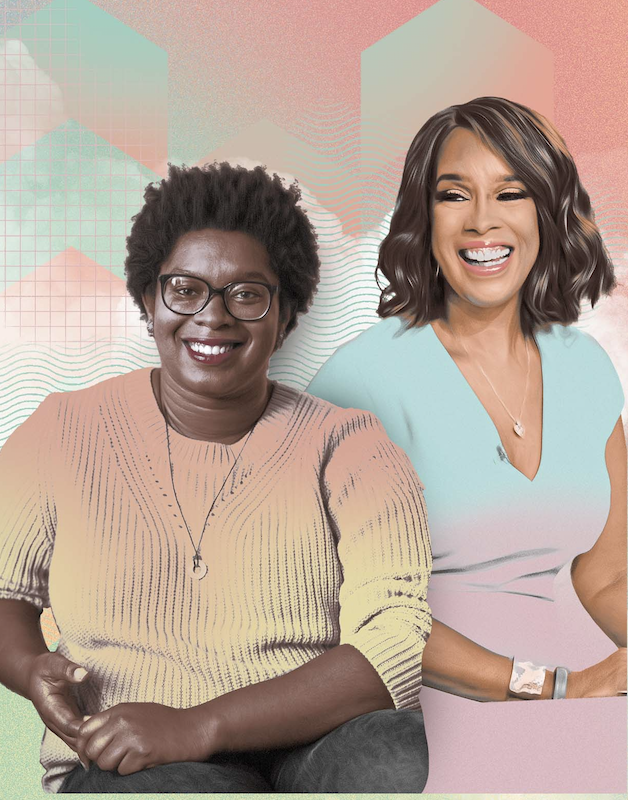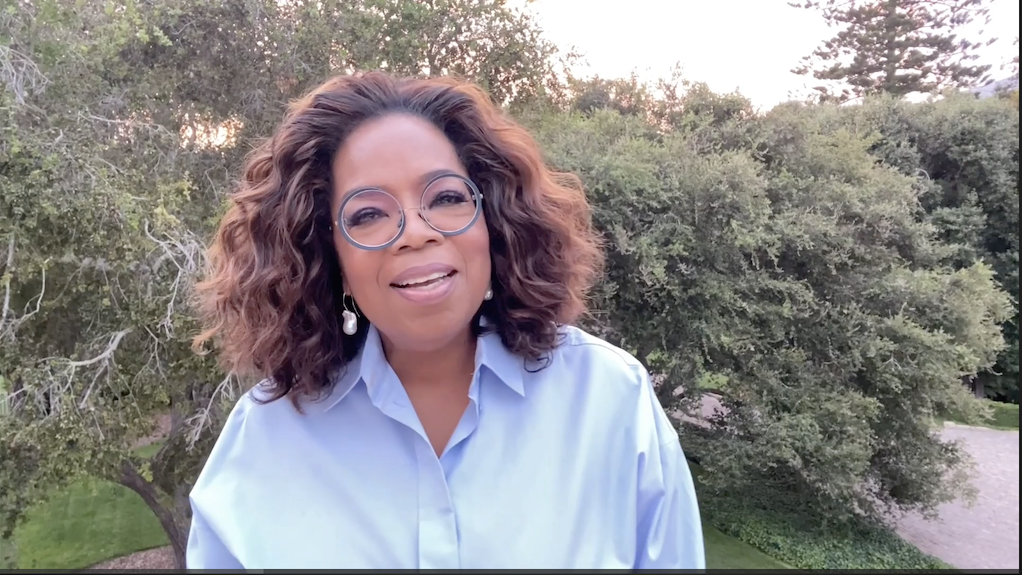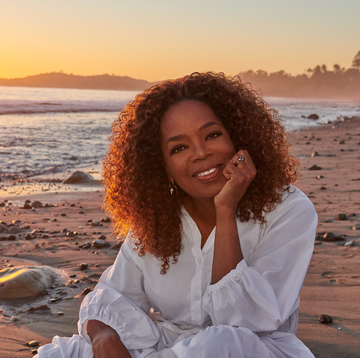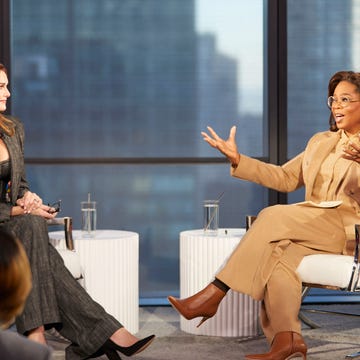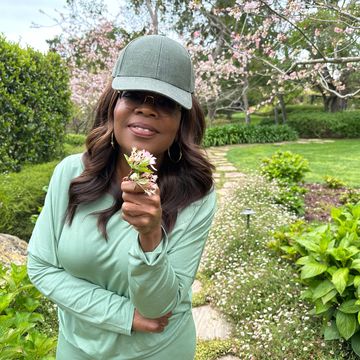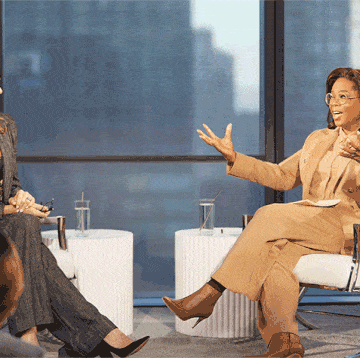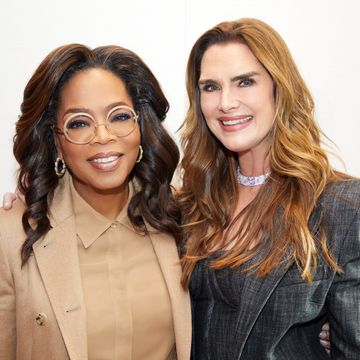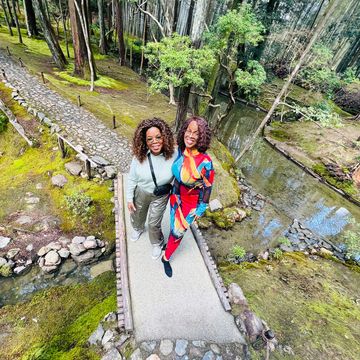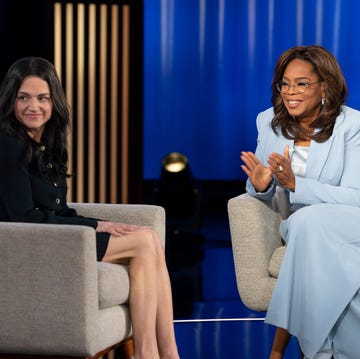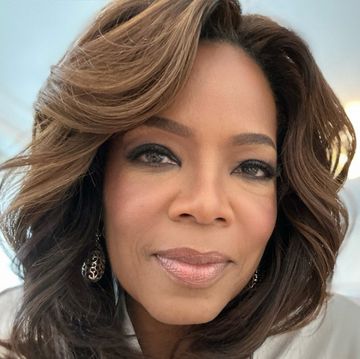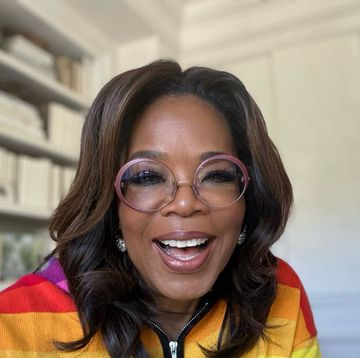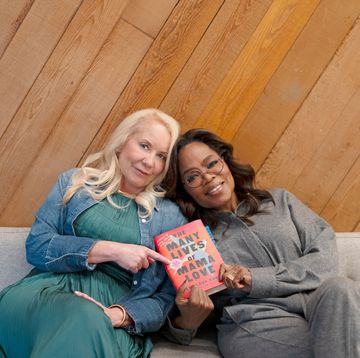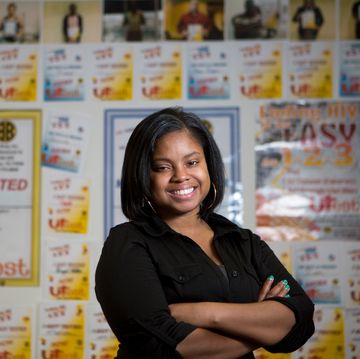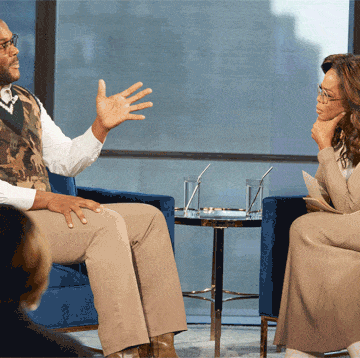Think about some of the best nights with your girlfriends—you know, the ones where laughing and chatting give way to soul-shifting conversations that make you feel deeply understood, supported, and like you can take on anything in the world. That feeling is at the heart of our new Oprah Daily Insider Roundtable series—and it’s hosted by our editor at large, Gayle King!
For the premiere event, Gayle was joined by Glennon Doyle, the bestselling author of Untamed and host of the We Can Do Hard Things podcast; Ashely C. Ford, writer and author of the New York Times bestseller Somebody's Daughter; and trauma therapist, life coach, and host of the podcast In the Light, Dr. Anita Phillips.
Oprah herself has said she has always believed that the number one job any of us has in this life is to become more of ourselves—to grow into the best possible version of ourselves that we can. That’s why these four powerful—and insightful!—women discussed the importance of embracing your truest self.
We hope you tuned in live—but in case you missed it, you can watch the episode right at the top of this article, or keep reading below for a recap, available exclusively for Oprah Daily Insider. Not an Oprah Daily Insider yet? Join by clicking the link below to access exclusive digital and print content, weekly messages from Oprah, and opportunities for more events like this one.
Become an Oprah Daily Insider Now
GAYLE: There’s been a lot of talk about what people missed during lockdown, but what about the stuff that you didn’t miss? What is the one thing you stopped doing during isolation that you said to yourself, I’m never ever doing that again?
GLENNON: I have forgotten why we wear heels! I’m looking at my closet thinking, Why did I ever do any of this to myself? Suddenly, heels make no sense to me. I’m like, oh, why are they trying to make us slower and in pain? Why do our legs have to look different? Suddenly bras, what? Why? Why does the world hate women? Why are they still uncomfortable? Why? So, I have a different perspective on what I want to put on my body and what I will not put on my body. The priorities are feeling confident and comfortable.
GAYLE: Well, people say that heels, Glennon, give your leg a nice look. I don’t know why they have to be so uncomfortable. So I hear you on that. I like what you were saying about clothes, because I’m starting to think elastic is a good thing.
ASHLEY: I don’t do hard pants anymore.
GLENNON: Hard pants?
ASHLEY: Denim, or anything that is restrictive. I spent quarantine figuring out how to get out of hard pants—I'm not going back.
GAYLE: A lot of people, myself included, certainly gained weight during this pandemic.
DR. ANITA: I definitely put on the 2020 20, and I still have it. I didn’t notice it going on, but when it was time to put on hard pants, those pants told the story. It’s actually been really challenging, because I have to adjust to how I see myself and accept a new shape of me. I’m needing to be really intentional about it, because there’s so much shame attached to weight and size—I’m not exempt. So I’m regaining my balance and
my generosity toward my body.
GAYLE: Did you not have a generosity toward your body before? Because I confess I’m a slave to the number. You should not even weigh yourself—just base it on how you feel and how your clothes fit. But I’m still a slave to the number.
DR. ANITA: I felt like I was, but maybe I wasn’t because I felt like it was okay. I’m with you about the scale because I’m wearing Spanx right now. I’m getting a little older. I see 50 coming around the corner and my body’s changing, and I need tore-up my whole relationship with what my body’s doing.
GAYLE: Ashley, what about you? I know you said “hard pants”...
ASHLEY: Another thing that I gave up or even was forced to give up during the pandemic that I’ll continue is, I don’t make plans with people I don’t want to see anymore.
GAYLE: I’m single, and I found being single in the pandemic was very hard. In the beginning, we were broadcasting from home, too. So I literally never left the house. I found myself missing people I don’t even like.
I think it was Gavin de Becker who likes to remind people, “No is a complete sentence.” Before, I would always find when people would ask me to do something that I don’t want to do, I would say, “Well, I wish I could, but I have to do blah, blah, blah.” Oprah says, “Gayle, why don’t you just remember what Gavin says?” I always feel I have to offer an explanation if people ask me to do something and I can’t or don’t want to do it. None of you have that issue, it seems?
ASHLEY: I used to choose a lot of people over me. That’s one of the major shifts that I had during the pandemic—learning how to be on my own side. Not just in a protective way but also just in a loving way. I’d think, If I had a child, would I force them to go spend time with another child who made them feel worse about themselves? Absolutely not. So why would I dot hat to myself? I’m not going to do it anymore.
I think what happened, honestly, was that I started liking myself a whole lot. I started prioritizing doing things that I like and my comfort and my hobbies and my interests. Not that I don’t engage with other people, but just that I prioritize me. I started really liking my own company in away that other people then had to compete with.
GLENNON: Those are both related—the clothes and the not going. We’ve had time to think about who we are and what we want and what we will not accept anymore—whether it’s stilettos or that jerk that we’ve been going to lunch with forever for some reason. It’s being fiercely on our own side and not changing for the world, but rather changing our friends and our clothes to fit us.
GAYLE: So on the flip side, what is something that you got to do during the pandemic that you’d like to continue when things go back to normal?
DR. ANITA: Oh, that’s an easy one for me. I got to spend so much time with my adult children. My son is 23 and my daughter is 19 going on 39. They both were out of the house, so we were empty nesters for like six months before the pandemic hit—and then our children needed to come home and live with us. At first, I was like, oh gosh, we just got our little empty nest thing going. But I loved spending time with them and getting to know them as adults and laying this foundation for our adult relationship. It made me think we rush our kids out of the house. It’s like, okay, you’re 18. You got to go to college. You...
GAYLE: Get a job.
DR. ANITA: Right, and I do want you to get a job and keep a job. You can be off my payroll but still be at the house. So, we had them at the house, and I loved spending that time with my family, and that’s something I’m not willing to reduce. I’m not willing to give up how much time we got to spend together.
ASHLEY: I moved from Brooklyn to Indiana. There were quite a few people who were concerned I did it because of money. Thankfully, that’s not the case. I came back because the people who make me feel most loved and emotionally safe and cared for, and the people who I feel deeply in community with, are people who live here. I wanted those people to be 10 minutes away and not a flight away.
The thing that has made me the happiest since being back here is getting to be involved in my friends’ kids’ lives—and I’m not giving that up.
GAYLE: Glennon, are there things you refuse to give up?
GLENNON: Yes. We live in a culture that values going, going, going, and productivity, and showing up—it really caters to an extroverted way of being. I think this pandemic gave me a chance to live my best life in some ways—more time alone, slower, not showing up all the time, a lot of thinking time. I have a child who is like me, more introverted, and it gave her a chance to live more in tune to who she really is.
It made me see that I want to decide how my life runs, and bring much more of this way of life that is truer to me into the after. I’m not starting up again. I’m not doing it. I’m not going to pretend like the entire world revolves around me showing up seven million places anymore. I’m just going to stay in my pajamas when I want to stay in my pajamas.
GAYLE: Many people have felt anxiety with the world opening back up. They’re calling it social anxiety as we’re starting to move about the world. I went to the airport for the first time and there were so many people—it made me nervous. But I also know we have to reenter society. Have any of you felt that way?
DR. ANITA: I’ve been doing pretty well with it. But a lot of people are struggling. Anxiety went through the roof during the pandemic—it’s real. I want to throw out a term that people don’t hear a lot: agoraphobia, which is a type of anxiety disorder that is associated with fear of being in places that you might not be able to get out safely from. If anybody feels like that anxiety is going a little further than what seems normal, I want you to pay attention to that. It’s okay. We just went through an incredibly difficult time. Some of us have been shaken up in ways that are going to have a ripple effect for some time in our lives. We’re going to see people dealing with agoraphobia and different anxiety disorders.
During the pandemic I was actually conscious of making sure that I took care of myself. Even when I couldn’t go into public places, sometimes I would envision myself walking around an airport or a mall and allowing myself to see that as a positive thing so that I don’t attach a stigma to it. That’s something that people can start to do if they’re anxious.
Now, if you’re choosing to no longer run the race in the fast lane, that’s cool—if it’s a choice. But if anxiety is holding you back, don’t ignore that.
GLENNON: That’s such an important distinction. That rang a bell to me. So if it’s something that you want to do, but your anxiety is holding you back, that’s when you pay attention. But if it’s something that you don’t want to do, then you just don’t do it. You don’t have a problem, you just have a decision.
DR. ANITA: Yes! I think what we’ve all said in one way or another is that the pandemic helped us cast off “I can’t” and “I have to,” and made us pick up “I choose” and “I choose not to.” That will shift the experience of power in your life—to know you can choose to do something or not to do something, that you don’t have to do anything.
GAYLE: The past year and a half has encouraged people to do a lot of soul-searching—to dig down deep and roll around in it. So, how do you know when you’re being true to yourself?
GLENNON: When I think about myself as a fixed thing that I’m trying to be, it never goes well. Who I am is intuition, emotion, imagination—it’s changing all the time. The way I think about it is the way I got sober. The only way I know I’m being myself is when I don’t have two selves—when I don’t have an inner self that’s saying and doing certain things and having certain feelings and an outer self who is doing something completely different.
So it’s that idea of living with integrity—not doing the right thing, because what the hell is that? But being integrated—that how I really feel is what I’m really saying. And what I really want is what I’m really choosing.
GAYLE: Did it take some work to get there for you?
GLENNON: I had the blessing of being a person who’s had several mental health crises.
GAYLE: You called it a blessing. How is it a blessing?
GLENNON: Oh my God, it’s the luckiest thing in the world, because we accidentally forget to teach children and human beings how to be human. I was a teacher. I spent six months teaching my kids about ancient Egyptian hieroglyphics but never like, here’s what feelings are and how to deal with that. When you have a mental health crisis, you have the gift of being part of programs where they actually teach you how to be a human in the world. And it’s often the only people who get that gift, or that sort of training, are people who have some kind of crisis. Dr. Anita, wouldn’t you say people come to you in crisis to learn?
DR. ANITA: Absolutely. And it’s an emotional crisis, because we are taught to suppress our emotions, and that our mind is like the king. But your heart is really king, and we have not learned to live from that space. Finally the heart is making so much noise, people can’t quiet it. Then they show up at my office and they’re like, how do I quiet it? And that’s my answer: Don’t. Listen to this voice that’s finally increased in volume enough to guide you. I think that is the beginning of that journey to being your authentic self. I’m myself the most when I have that sense of filling my lungs—I’m fully breathing. People can get to that space, but the heart has to guide you there.
GAYLE: Ashley, do you know when you’re being yourself?
ASHLEY: Every once in a while, it feels like this veil is lifted and, for a second, I see my real life. I see the kind of love I dreamed of in friendship and in family and romantically—I see how it showed up in my husband and my friends and my sister and my dog. I’ll have a moment where I think, You really did it. Those are the moments when I feel most like myself, because those are the moments when I see myself without the projection of what I think anybody else would want me to want.
It reminds me of being in second grade and getting glasses for the first time and putting them on and realizing that I could see the leaves on the trees from the road, and that I didn’t have to actually climb the tree and be in it to see the leaf—that was wild to me. And that’s how it feels sometimes when that veil is lifted and when I get that clear picture of myself. It reminds me a lot of what Glennon and Dr. Anita said—it’s this lining up, this integration. It’s like every version of me that I’ve ever been is lined up and pointing forward at the same time. That’s when you go, yeah, we’re on the right path. We found it.
GLENNON: When that’s not happening, I tend to get really bitter and terrible. It takes me several weeks of moaning, and at some point I notice that I’m complaining a lot or I’m feeling bitter—that’s my signal. One of my most important markers to know that I’m acting out of integrity is when I find I’m explaining myself a lot or I’m being defensive. That means that I’ve forgotten that I am a grown-up who gets to make my own decisions, and no one can take that from me.
GAYLE: Does it take courage to live authentically? Glennon, where have you found that courage?
GLENNON: I have one thing, and that one thing is my sobriety. I feel very blessed about that. I have a life where decisions are very clear because of that. My sobriety is completely based on living with integrity, which means telling the truth at any given moment. So when people were telling me I was throwing my career away if I was open about my relationship with Abby, I said, “Okay.”
GAYLE: Did people really tell you that it would be throwing away your career?
GLENNON: Many times. I was at one particular meeting where there were a lot of people at a table. One of the people I trust most with my career said, “You can do this, but I want you to know full well it will be career suicide.”
But I had this secret. I knew if that happened, I’d be okay. I also knew it wouldn’t happen, because people respond to the truth—even if it is messy, even if you happen to be a Christian who suddenly turns into a lesbian. Whatever it is, as dramatic as it is, people respond to the truth. It creates this freedom that is contagious.
Once somebody lives boldly and authentically, it may piss some people off at first. But then they go, “Wait, if she can do that, I wonder if I could do that?” It becomes a ripple.
DR. ANITA: I have something I like to say a lot: It’s not complicated, but it is hard. It is as simple as that. Sometimes we complicate things because we’re overthinking them—we have all these reasons why this can’t work and that can’t work. And we want to believe it’s complicated because that gives us an excuse to spend months, years, decades stuck in neutral. But when you finally accept that it is not complicated at all, but it is hard, then you just decide, Am I going to choose to do this or not to—because it’s hard.
ASHLEY: I just wrote that down!
DR. ANITA: I think a lot of times the choice people are making is, Am I going to risk getting hurt by other people, or am I going to get hurt by me? Many of us want to control the hurt and we get stuck in that.
GLENNON: By the way, the other way is hard, too. We are trained to think that telling the truth and living authentically is hard. But you know what’s hard? Not doing that.
It’s hard to twist yourself in knots and not live your one beautiful, precious life the way you were meant to live it. It’s tough to tell the truth and lose some people. But those were the people you were meant to lose. It’s all hard, so you have to decide what the right kind of hard is.

Shelby Copeland is an associate editor and the assistant to O's editor-at-large, Gayle King. When she's not in assistant mode or writing for Oprah Daily, she loves spending her time listening to music and podcasts, reading, re-watching old sitcoms, and eating Cinnabons at brunch.
